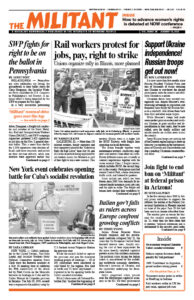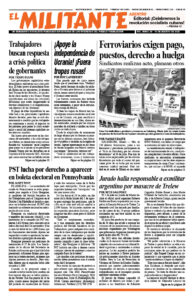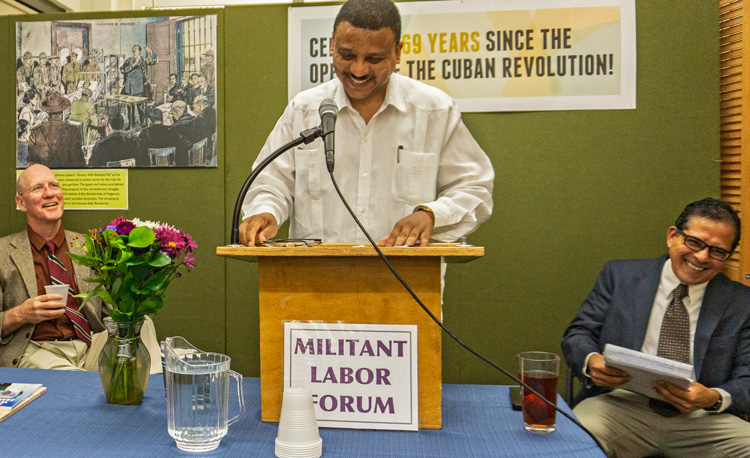NEW YORK — Cuba’s ambassador to the United Nations, Yuri Gala Lopéz, and Socialist Workers Party National Committee member Steve Clark were the featured speakers at a July 30 meeting here to celebrate the 69th anniversary of the attack led by Fidel Castro on the Moncada barracks in Santiago de Cuba and the Carlos Manuel de Céspedes garrison in Bayamo. The July 26, 1953, assault was a response to the military coup by U.S.-backed tyrant Fulgencio Batista the previous year.
While the assault failed to capture the garrisons and arm the insurgent working people of Santiago — 56 of 160 combatants were murdered in cold blood by the regime, five died in battle and 32 were imprisoned — it proved to be the opening battle for Cuba’s socialist revolution.
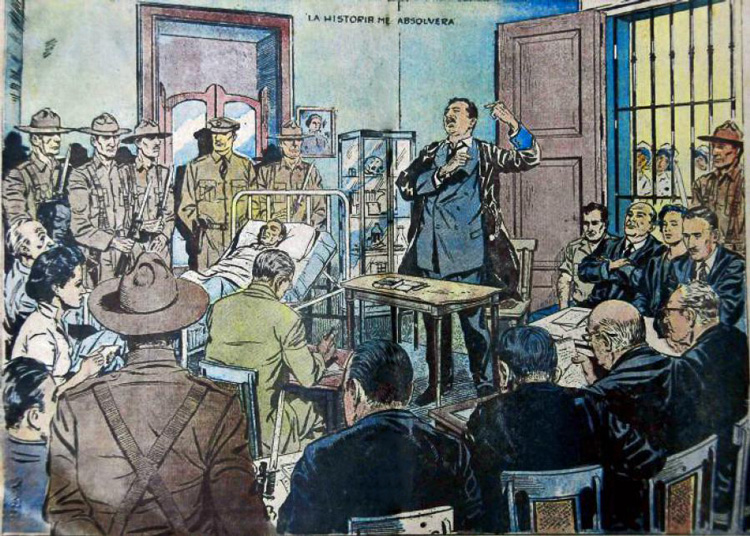
What Cubans now call National Rebellion Day “marked the beginning of a new stage in our nation’s struggle to achieve our true independence,” Ambassador Gala said. It had been celebrated earlier that week in Cuba with participation by Army General Raúl Castro and Cuban President Miguel Díaz-Canel.
The 1953 action “meant the solidification of a revolutionary movement that never wavered in its struggle until achieving the final victory on Jan. 1, 1959,” Gala said. The Cuban Revolution “remains strong because our people inherited throughout its history solid concepts and revolutionary principles from men and women who gave everything.”
Clark highlighted the class composition of the young combatants — including bricklayers, masonry workers, carpenters, peasants and farmworkers, and factory workers. “The socialist character of the accomplishments of the Cuban Revolution and the Marxist character of its leadership are what make it so decisively important for working people the world over,” Clark said.
Sixty-five people attended the special Militant Labor Forum, sponsored by the New York and Northern New Jersey branches of the SWP.
A drawing by a Cuban artist of Fidel Castro delivering closing remarks to the court that convicted him in October 1953 was among the displays around the room. Those remarks, known ever since as History Will Absolve Me, were printed clandestinely and used to popularize the program of the Cuban Revolution, carried out to the end by the revolutionary movement led by Fidel Castro.
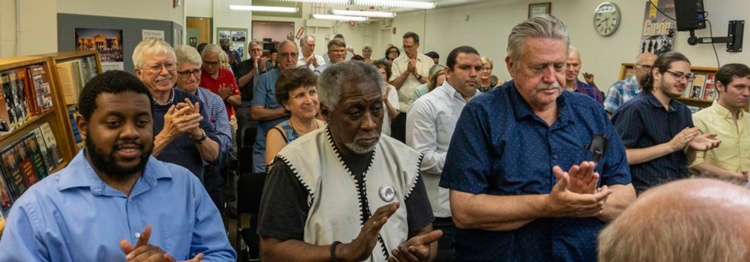
Those in the audience recognized from the podium were Iván Casal and Yoangel Valido, second and third secretaries to Cuba’s U.N. Mission; members of the New York/New Jersey Cuba Sí coalition; Wilma Paster from Acción Revolución, an Ecuadoran group; Alegna Cruz from the Puerto Rican Nationalist Party; and Juanita Young, whose son Malcolm Ferguson was killed by New York police in 2000. Young led a delegation of Mothers against Police Brutality to Cuba in May 2016.
A reception before and after the program gave participants an opportunity to meet the speakers and talk informally.
‘Inhumane U.S. blockade’
Gala pointed to Washington’s more than six-decades-long economic war against Cuba, carried out by every U.S. president since Dwight Eisenhower.
“During the Trump administration 243 unilateral coercive measures were adopted against Cuba,” Gala said, and “remain in force under the current U.S. administration. No Cuban family is spared the effects of this inhumane policy.”
For 29 years, Gala said, the U.N. General Assembly “has adopted a resolution on the necessity of ending the blockade imposed by the U.S. against Cuba.” The number of member states voting for the resolution has been increasing, with a tally of 184 to 2 in June 2021. “So, Cuba is on the right side of history!”
The next General Assembly vote is coming up this fall.
Solidarity and internationalism guide Cuba’s foreign policy, Gala said. Cuba has developed three COVID-19 vaccines, whose benefits are “not limited to our borders.” During the pandemic, Cuba has sent 57 brigades to 40 countries to help fight the virus.
The ambassador ended his remarks by quoting Fidel Castro. “If we had given up after Moncada … we would have been defeated,” Castro said at a July 26 celebration in 1967. “That should always be our attitude, and the great lesson of our history.”
Affirming the pledge made by Raúl Castro at the 2018 Moncada celebration, Gala concluded to a standing ovation: “No matter how difficult the circumstances, no matter how great the challenges, our people will forever defend their socialist revolution.”
‘How are WE doing?’
Across the spectrum of bourgeois politics, Steve Clark pointed out, everyone keeps asking the question, “How is Cuba doing?”

“You hear it from right-wing opponents of the revolution,” Clark said. “You hear it from liberals and the middle-class left. How well is Cuba doing in face of shortages and blackouts? Or on ‘the race question’? Or ‘winning the youth’? Or women and the family?”
Yes, of course, those are issues for Cuban working people and their leadership, Clark said. “But they’re the wrong question to stew over for revolutionary-minded workers and youth here who support the Cuban Revolution.”
“How are WE doing? That’s the question the SWP is interested in,” Clark said.
How are we doing in building the kind of working-class party that can organize and lead workers and farmers to emulate what Cuba’s toilers showed is not only necessary but possible?
“How are we doing in advancing prospects for a socialist revolution in the U.S.? And lifting the never-ending imperialist economic and military pressure off Cuban working people?”
The Cuban Revolution, Clark said, “didn’t just transform the lives, conditions, and political consciousness of workers and farmers in Cuba. It marked a renewal of communist leadership worldwide.
“The Socialist Workers Party wouldn’t exist as the proletarian party we are today if it weren’t for the Cuban Revolution led by Fidel Castro and the Rebel Army leadership,” Clark said.
In 1960 Jack Barnes, now the SWP’s national secretary, visited Cuba for the summer. Clark urged participants to read about that experience in Barnes’ book Cuba and the Coming American Revolution, which describes the profound impact of the Cuban Revolution on politicizing workers and youth in the U.S. After returning, Barnes helped launch a Fair Play for Cuba Committee chapter at the Minnesota college he was attending and soon afterward joined the SWP.
In the book, Clark said, Barnes recalls a lasting lesson he learned at the time of the U.S. government-organized Bay of Pigs invasion of Cuba in April 1961. Barnes wrote that he had “said something slightly ultraleft and self-serving over the phone to Ray Dunne about feeling guilty” that he wasn’t in Cuba with young revolutionists he’d become friends with during his 1960 trip.
Dunne was a veteran SWP leader who’d been a founding member of the communist movement in the U.S. and leader of the Teamsters organizing drives that brought hundreds of thousands of over-the-road truckers into the union in the 1930s.
“Ray was comradely but unsympathetic,” Barnes wrote. “‘You have no doubts about what the people you were closest to in Cuba are doing,’ he told me. ‘They’re fighting. And they assume you’re doing the same thing, wherever you are. So you better prove them right and stop pandering to your emotions.’”
That lesson, Clark said, is central to the SWP’s program and course: Proletarian internationalism begins with building a communist party to advance the socialist revolution right where you are.
“That’s our pledge to comrades in Cuba,” Clark said. “That’s why when SWP members speak at events there and talk informally with Cubans, our number one job is to explain what we’re doing to live up to that pledge.”
“Cuban workers and farmers and their leaders have done their part for 69 years and counting,” Clark said. “The Socialist Workers Party puts to ourselves — and to working people and youth we talk with and join in battles alongside — Fidel’s programmatic and action guide in History Will Absolve Me:
“Not ‘We promise to give you this or that.’
“But, ‘Organize and fight with everything you have.’”
End U.S. economic war on Cuba!
Other speakers at the event were Sussen Gazal, active in the July 26 Coalition in Boston, and Chris Hoeppner, the party’s candidate in Pennsylvania’s 3rd Congressional District.
Gazal described her February 2020 trip to Cuba. What she experienced there, she said, convinced her when she returned that she “had a responsibility to educate, inform, protest, so more people could spread the truth about Cuba and demand an end to the blockade.”
Hoeppner, a freight conductor on the railroad, described talking with co-workers about lessons the working class can and must learn here from the socialist revolution in Cuba. Hoeppner also reported on the successful effort to collect more than 2,400 signatures to put his name on the ballot as the SWP candidate for Congress in Philadelphia (see article on front page).
The program ended with a toast led by Clark and Gala to the 160 combatants who opened the fight for Cuba’s true independence and socialist revolution in 1953, as well as for an end to Washington’s economic war and travel restrictions against the Cuban Revolution.
